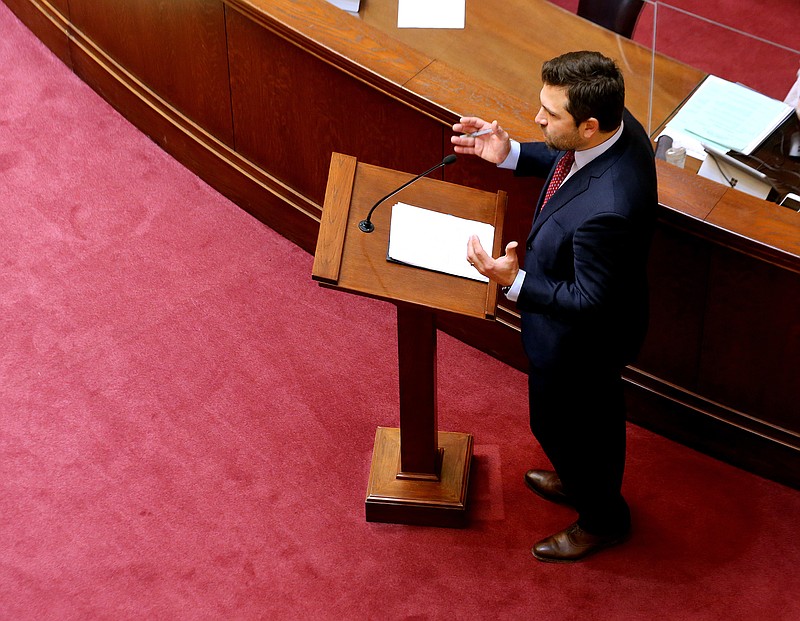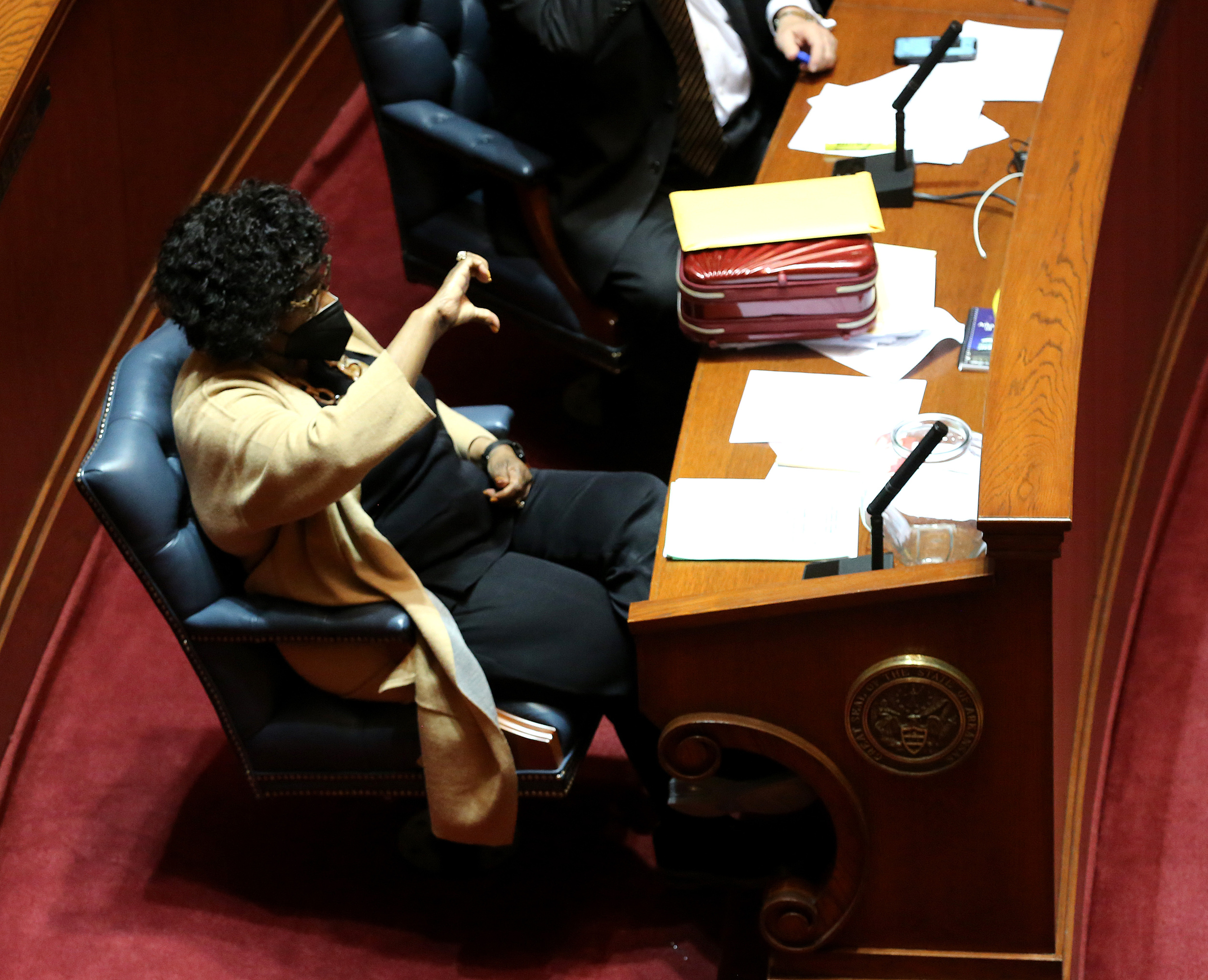The Arkansas House of Representatives and Senate on Wednesday handily approved identical income tax cut bills that state officials estimate will eventually provide nearly $500 million a year in tax relief for Arkansans.
The House and Senate also overwhelmingly approved identical bills that would provide recycling tax credits aimed at getting a proposed U.S. Steel expansion in Mississippi County.
Arkansas is competing with Alabama and Mississippi for a proposed $3 billion expansion that would create 900 jobs, the sponsors of the bills said.
The legislative action came on the second day of a special legislative session called by Republican Gov. Asa Hutchinson primarily to enact what potentially would be the largest tax cut in the state's history. Legislative leaders hope to wrap up the special session today, but some lawmakers want to extend the session to consider other bills not on the governor's agenda.
The identical income tax bills would cut the top individual income tax and top corporate income tax rates, consolidate the low- and middle-income tax tables, and create a nonrefundable low-income tax credit.
Two of Arkansas' neighbors -- Texas and Tennessee -- don't have state income taxes.
BILLS APPROVED
In an 82-16 vote, the House approved one of the two identical income tax bills -- House Bill 1001 by Rep. John Maddox, R-Mena. The Senate Revenue and Taxation Committee later recommended Senate approval of HB1001.
In a 30-4 vote, the Senate approved the other identical bill-- Senate Bill 1 by Sen. Jonathan Dismang, R-Searcy. The House Revenue and Taxation Committee later recommended House approval of SB1.
The bills are projected by the state Department of Finance and Administration to reduce state general revenue by $135.25 million in fiscal 2022, which ends June 30, increasing to $497.9 million in fiscal 2026. The tax cut would start midway through fiscal 2022.
Maddox told the House that HB1001 would simplify Arkansas' tax code, which he described as the most complex tax structure in the nation.
He said companies considering locating in the state always ask about tax policy as one of the first questions to the Arkansas Economic Development Commission.
"Some people don't think that people and companies look at tax rates when they locate in states, and I completely disagree," Maddox said. "We're betting on Arkansas. We're betting on growth. We're betting on continued inbound migration. ... Frankly, this is a pro-growth bill."
"This is not slash and burn tax policy," Maddox said. "This is fiscally responsible tax policy."
But Rep. Reginald Murdock, D-Marianna, said, "I cannot in good conscience, with the people I represent, vote for this, knowing we ignored so much that could have happened.
"The people I represent, they need help," he said. "You can't tell me about educational adequacy. It's not happening in this state. We have not done that. We can dedicate more dollars to this. We could have done better. This plan does not do that. We could have done better. We should have done better."
HOUSE DISCUSSION
The state Democratic House Caucus held a news conference Wednesday morning to release several proposals that they said would be a better use of the $600 million a year that the Institute on Taxation and Economic Policy estimated was how much the income tax rate cuts would eventually reduce state general revenue.
The House Democrats' proposals include $200 million for a rural infrastructure and economic fund; $182 million for free two-year college tuition; $100 million for 1,000 new pre-K classrooms; $80 million to create a state earned income tax credit for working families; and $37 million toward eliminating the developmental disability services wait list.
Rep. David Ray, R-Maumelle, said Wednesday that the state has already invested hundreds of millions of dollars in broadband, as well as on roads and bridges, and has increased teacher pay and will likely continue to do so. He also pointed to pandemic-related federal aid, including three rounds of stimulus checks, the child tax credit and rent assistance.
"We have to be a state that also rewards work, that rewards productivity, that rewards labor. If we don't, our safety net will become a hammock," he said.
Rep. Joe Jett, R-Success, said more than 104,000 people will no longer pay income taxes as a result of the bill.
"In my 10 years here, I have never worked harder ... in trying to make this the fairest tax package that we could from the top to bottom," he said.
In the House, all 78 Republican representatives plus Democratic Reps. Deborah Ferguson of West Memphis, David Fielding of Magnolia, Milton Nicks of Marion and Mark Perry of Jacksonville voted for HB1001. Sixteen Democratic representatives voted against the bill, and two other Democratic representatives didn't vote.
SENATE VOTE
In the Senate, all 26 Republican senators, plus Democrats Keith Ingram of West Memphis, Stephanie Flowers of Pine Bluff and Larry Teague of Nashville, and independent Jim Hendren of Sulphur Springs voted for the income tax bill, SB1.
Democrats Linda Chesterfield of Little Rock, Joyce Elliott of Little Rock, Greg Leding of Fayetteville and Clarke Tucker of Little Rock voted against the bill.
Ingram, who is the Senate Democratic leader, said in an interview that he voted for the bill in part because he represents a Senate district on the border with Tennessee and the total tax burden on people earning about $50,000 a year is about $1,933 in Tennessee, compared with slightly more than $4,000 in Arkansas.
Secondly, he said he has become comfortable with the tax cut triggers included in the bill. Those triggers block two years of tax cuts if the state has to dip into a catastrophic reserve fund because of an economic event that affects tax collections.
With Senate President Pro Tempore Jimmy Hickey, R-Texarkana; Joint Budget Committee co-chairman Rep. Lane Jean, R-Magnolia, and Jett, Ingram said, "I have confidence that we have built in something that if the economy should take a dive that we would be protected."
Thirdly, Ingram said, "the governor gave me his assurance that the [developmentally disabled care] wait list is going to be addressed, and he was very passionate in how he expressed to me that he is committed to making a significant impact, if not hopefully eliminating the DD wait list, and that's been one of my priorities since I have been here."
WAITING LIST
As of July 1, the number of individuals on the developmental disability care waiting list totaled 3,241, state Department of Human Services spokeswoman Amy Webb said Wednesday.
In a written statement, Hutchinson said he appreciates Ingram's advocacy for the individuals on that waiting list.
"A plan to address this issue has been in the works prior to the session, and I hope to be able to provide more details before the end of the year," the governor said. "It will take legislative action that can be addressed in the fiscal session. I share Sen. Ingram's concern, and we are committed to making significant progress in reducing the waiting list. It should be noted that as we have reduced the waiting list, more sign up because they see progress and hope. The number on the list is a revolving number."
Hutchinson said he has worked throughout his time as governor to reduce the developmental disability wait list.
"My goal has always been to reduce that list through increased funding. I hope to announce more details in the coming weeks of efforts in the works on reducing the developmental disability wait list."
TAX CUT DETAILS
SB1 and HB1001 would reduce the three current tax tables to two by combining the lower- and middle-income tables, effective Jan. 1. The new table would apply to taxpayers with net taxable incomes of up to $84,500, while the high income tax table would apply to those with net taxable incomes above $84,500.
The top individual income tax rate would be cut from 5.9% to 5.5% on Jan. 1, and then to 5.3% a year later. The top rate would apply to the net taxable incomes between $39,700 and $84,500 for people in the combined low- and middle-income table, and to the incomes of at least $8,501 for people in the high income table, effective Jan. 1.
The top rate would drop to 5.1% on Jan. 1, 2024, and to 4.9% on Jan. 1, 2025, only if no funds are transferred out of the long-term reserve fund during certain periods, which would become known as the catastrophic reserve fund.
The current top corporate income tax rate of 6.2% will drop to 5.9% on Jan. 1, under a 2019 state law. The special session's bill would cut the top corporate rate from 5.9% to 5.7% on Jan. 1, 2023. That rate would drop to 5.5% on Jan. 1, 2024, and then to 5.3% on Jan. 1, 2025, but only if no funds are transferred during certain periods from the catastrophic reserve fund.
The measures would create a nonrefundable income tax credit for taxpayers with net income up to $24,700 who file their income tax returns on time. Taxpayers with net income up to $23,600 would receive a $60 tax credit against their income taxes due, with the credit reduced for each $100 of additional income.
The bills includes some fiscal measures aimed at ensuring the renamed catastrophic reserve fund stays at 20% of the total amount of net general revenue allocated in the past fiscal year. The long-term reserve fund balance now is about $1.2 billion.
RECYCLING TAX CREDITS
On Wednesday, the Senate voted 34-0 to approve Senate Bill 10 by Sen. David Wallace, R-Leachville, which is one of the two identical bills aimed at getting U.S. Steel to expand in Mississippi County. The House Revenue and Taxation Committee later recommended House approval of the bill.
The House voted 94-4 to approve the identical bill, House Bill 1007 by Jett.
Republican Reps. Jim Dotson of Bentonville, Clint Penzo of Springdale, David Ray of Maumelle and Richard Womack of Arkadelphia voted against the bill. The Senate Revenue and Taxation Committee later recommended Senate approval of the bill.
Wallace told the Senate that the proposed $3 billion expansion at U.S. Steel would be in addition to the company's existing $2 billion investment in Arkansas, and create 700 jobs making $120,000 a year and 200 jobs making $60,000 a year.
The recycling income tax credits authorized under the bill would cost the state an average of $11 million a year for 14 years and $8.8 million a year if the state buys back the tax credits at a 20% discount, he said.
SB10 and HB1007 would create a new project type for steel manufacturers to qualify for an income tax credit for waste reduction, reuse or recycling equipment.
State law now provides an income tax credit for 30% of the purchase price of waste reduction, reuse or recycling equipment for a qualified manufacturer of steel.
To qualify for the tax credit under SB10 and HB1007, a project would be required to have common ownership with and be located on the site of or adjacent to an existing qualified manufacturer of steel; have a total investment of at least $2 billion; create 700 new direct positions with an average annual wage of $120,000; and create 200 new independent direct positions with an average annual wage of $60,000, according to the state Department of Finance and Administration.
The project also would be required to have a positive cost-benefit analysis from the Arkansas Economic Development Commission and the Department of Finance and Administration; an incentive agreement with the commission with performance and clawback provisions; begin on or after Jan. 1, 2021; and a closing date of necessary debt and equity financing before July 1, 2023.
Gallery: Special Session of the General Assembly


